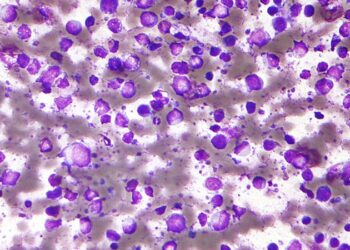TOPLINE:
Tenecteplase for acute ischemic stroke provided similar safety and effectiveness outcomes as alteplase, a new study showed, suggesting the drug is a viable alternative treatment.
METHODOLOGY:
- This comparative effectiveness study drew on data from the Get With The Guidelines –Stroke registry in the United States and included more than 79,500 patients with acute ischemic stroke (mean age, 69 years; 51% men; 67% non-Hispanic White individuals) who were enrolled between 2020 and 2022 and treated with intravenous thrombolysis within 4.5 hours of symptom onset.
- Overall, 11.9% of patients received tenecteplase and 88.1% received alteplase.
- The primary endpoint was functional independence at discharge, indicated by a modified Rankin Scale score of 0-2. Secondary endpoints included discharge to home, freedom from disability at discharge, and independent ambulation at discharge.
- Safety outcomes were symptomatic intracranial hemorrhage within 36 hours, serious systemic hemorrhage within 36 hours, a composite of both hemorrhage types, in-patient mortality, and a composite of in-patient mortality and discharge to hospice.
TAKEAWAY:
- After adjusting for covariates, tenecteplase and alteplase showed comparable effectiveness outcomes, including functional independence at discharge (adjusted odds ratio [aOR], 1.00), freedom from disability at discharge (aOR, 1.03), discharge to home (aOR, 0.99), independent ambulation at discharge (aOR, 0.99), and discharge to home plus independent ambulation at discharge (aOR, 0.98).
- Safety outcomes also did not differ between the treatment groups, including for symptomatic intracranial hemorrhage (aOR, 0.96), a composite of it, serious systemic hemorrhage (aOR, 0.95), in-hospital mortality (aOR, 0.95), and a composite of in-hospital mortality and discharge to hospice (aOR, 0.98).
- Among patients who were eligible for but did not undergo endovascular thrombectomy (EVT), those treated with tenecteplase showed significantly greater improvements in discharge to home (aOR, 1.26) and in-hospital mortality (aOR, 0.63) than those treated with alteplase.
- Among EVT-treated patients, effectiveness and safety outcomes, including successful reperfusion rates, did not differ statistically between the two groups.
IN PRACTICE:
“This study supports tenecteplase as a reasonable alternative to alteplase, with practical advantages for tenecteplase preparation and administration,” the investigators wrote.
Authors of an accompanying editorial wrote, “As tenecteplase adoption increases, it could also help reduce the complexity and costs associated with acute stroke management, ultimately improving access to high-quality care.”
SOURCE:
The study was led by Justin F. Rousseau, MD, University of Texas Southwestern Medical Center, Dallas. The editorial was led by Lina Palaiodimou, MD, National and Kapodistrian University of Athens, School of Medicine, “Attikon” University Hospital, Athens, Greece. The study and editorial were published online on March 12 in JAMA Network Open.
LIMITATIONS:
The observational study lacked randomization and registry data were self-reported with nonblinded outcome assessments, allowing potential residual confounding. Variability in tenecteplase dosing across sites was not adjusted for and interfacility transfer patients were excluded, limiting the assessment of transfer-related benefits. The investigators also included only patients with a final discharge diagnosis of acute ischemic stroke, possibly missing those initially coded as having a transient ischemic attack, and did not analyze 90-day outcomes because of missing data. Additionally, inconsistent vascular imaging for large vessel occlusion evaluation and selection bias in early adopter sites may have affected the results.
DISCLOSURES:
This study was partly funded by an early career research grant. Several investigators reported receiving grants and personal fees, having research contracts, and serving on advisory boards of various sources. Full details are provided in the original article. The editorialists reported no relevant conflicts of interest.
This article was created using several editorial tools, including AI, as part of the process. Human editors reviewed this content before publication.
Source link : https://www.medscape.com/viewarticle/tenecteplase-matches-alteplase-ischemic-stroke-care-2025a10007gh?src=rss
Author :
Publish date : 2025-03-28 10:20:00
Copyright for syndicated content belongs to the linked Source.














